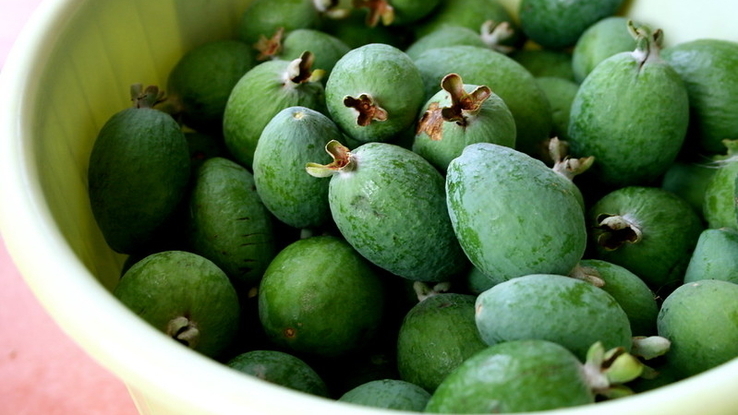Consider the Function F That is Continuous on the Interval

While figs might be the only fruit many people can name that begins with the letter F, there are others. Some are variations of fruits that don't begin with the letter F, like Fiji apples, but a surprising number of them, such as farkleberries, feijoas, fibrous satinash and finger limes, are distinct types of fruit in their own right.
Farkleberry
While this plant may sound made up, farkleberries do indeed exist. Also known as sparkleberries, this fruit isn't grown commercially. However, it's edible and grows from Florida and Virginia in the east to Nebraska and Texas in the west. It often grows in sandy soil or even sand dunes.

The berries range from bitter to sweet and are tough to chew. The plant itself grows to be 15 feet tall, with some reaching as high as 30 feet.
While this fruit is native to parts of Columbia, Brazil, Paraguay, Uruguay and Argentina, its biggest fans might be in New Zealand, where Feijoa trees are so common that many people skip the supermarket and get theirs for free straight from the source. They're used for smoothies, wine, vodka, yogurt, jam, baked goods, salads, ice cream and even chocolate. The taste is hard to pin down, although it's been compared to guava, quince, pineapple or even strawberries. It also has a cool aftertaste due to the presence of methyl benzoate in the fruit.

The fruit is green, about the size of an egg and has a distinctive fragrance. It grows to around 15 feet on average and has white and purple flowers.
Fibrous Satinash
Also known as a bamaga, the fibrous satinash grows in rainforests in Indonesia, New Guinea and Australia. The small, berry-like fruit is pink or red in color and has a sour taste and smooth yet leathery texture. It's often used in jams, jellies and desserts.

The plant itself is resistant to water and has cream-colored flowers. Its beautiful appearance and ability to attract birds make it a popular plant for gardens.
Fig
Figs originally grew from western Turkey to northern India, but today they're grown around the world, especially in Mediterranean countries and California. While fresh figs perish quickly, when dried, they can last for several months. Figs are commonly used in baked goods such as breads, cakes, pies, marmalade and jams. Because of their short shelf life, figs are better sold in direct sale settings such as at farmers' markets and roadside stands.

Fig plants resemble small bushes and are in the same family as mulberries. They were some of the first fruit-bearing plants to be domesticated and were particularly popular in Ancient Greece. They continue to be a food staple in the Levant and Mediterranean.
Finger Lime
Also known as a caviar lime, the finger lime is another Australian native. The fruit is tube-shaped and only two to three inches long. The skin can be pink, green or other colors, while inside are green, yellow, pink or red globules that look like caviar. The finger lime is genetically distinct from the limes you can buy at the supermarket and grows on short, thorny trees in rainforests.

Gourmet cooks value finger limes for their ability to add citrus flavor to a dish without making it too acidic, since each globule is protected by a thin membrane. However, they can be quite expensive, especially if you try to have them mailed from Australia. You can buy them for slightly less from a few California growers that have recently started to raise them.
Fuji Apple
Fujis are a sweet, juicy variety of apple that store well. They can be used in a variety of ways, including baking, snacking, juicing or in salads, and they stay fresh longer than other varieties. They respond well to refrigeration and respond well to being frozen.

Fuji apples were first created in Japan by combining a Ralls Janet with a Red Delicious. They've since become popular in the United States as well, and more Fuji apples are now grown in the United States than Japan.
Source: https://www.reference.com/world-view/fruits-start-letter-f-b397504b64bb0f2e?utm_content=params%3Ao%3D740005%26ad%3DdirN%26qo%3DserpIndex&ueid=0614cb70-a543-4466-808f-3715569ed20e
0 Response to "Consider the Function F That is Continuous on the Interval"
Postar um comentário